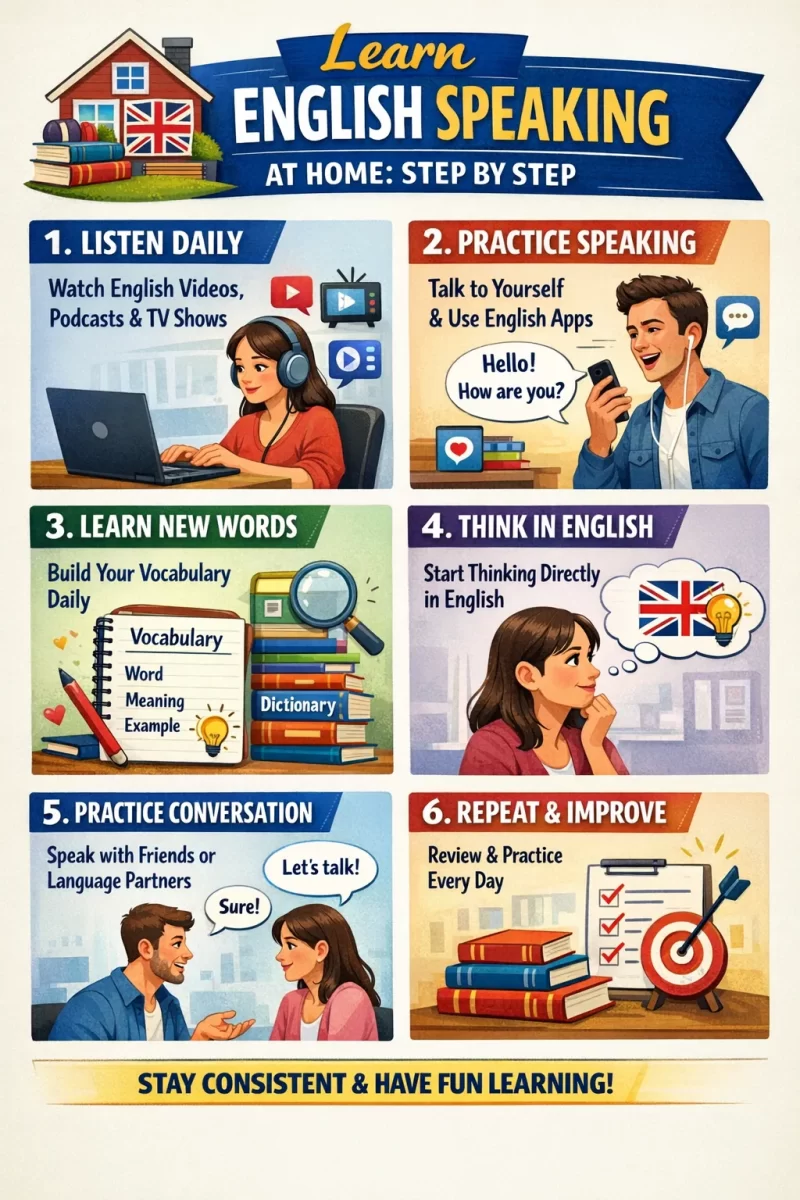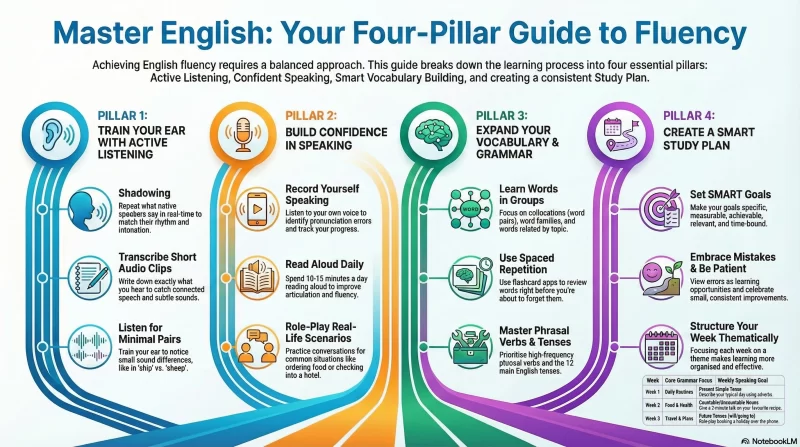
Are you looking for ways to improve your spoken English? Check out these 100 tips to help you speak English confidently and fluently. From practicing daily to learning new vocabulary, there are plenty of strategies you can use to improve your language skills.
Speaking English fluently can be challenging, especially if it’s not your native language. But with dedication and practice, you can improve your language skills and become more confident in your ability to communicate effectively in English. In this post, we’ve compiled a list of 100 spoken English tips that you can use to enhance your fluency, expand your vocabulary, and build your confidence. Whether you’re a beginner or an advanced learner, these tips can help you take your spoken English to the next level. Let’s get started!
100 Tips for Success – Spoken English Tips
-
Speak clearly and slowly
-
Use simple words and sentences
-
Practice daily to improve fluency
-
Listen carefully to others when they speak
-
Read aloud to improve pronunciation
-
Learn new vocabulary regularly
-
Use correct grammar and punctuation
-
Watch English movies and TV shows with subtitles
-
Ask for feedback from native speakers
-
Use language learning apps
-
Practice with a language exchange partner
-
Join a language learning group
-
Speak with confidence
-
Don’t be afraid to make mistakes
-
Avoid using slang too much
-
Use idioms and phrases to make your speech more interesting
-
Speak to yourself in English
-
Use a dictionary to look up unfamiliar words
-
Use gestures to convey meaning
-
Try to think in English
-
Focus on speaking, not grammar rules
-
Use online resources to improve pronunciation
-
Practice listening to different accents
-
Use flashcards to learn new vocabulary
-
Listen to English music and try to sing along
-
Watch English news channels
-
Learn about English culture
-
Use language learning games
-
Practice with tongue twisters
-
Use repetition to help remember new words
-
Use visual aids to learn new vocabulary
-
Use social media to interact with native speakers
-
Use English subtitles when watching foreign movies
-
Use correct intonation to express emotions
-
Try to mimic native speakers
-
Use online forums to practice writing in English
-
Use your body language to help communicate
-
Try to use English in everyday situations
-
Try to learn a new word every day
-
Use real-life situations to practice speaking
-
Use role-playing to practice speaking
-
Use a voice recorder to improve pronunciation
-
Learn about English slang
-
Use online dictionaries to improve vocabulary
-
Try to think in English when writing
-
Use podcasts to improve listening skills
-
Use online quizzes to test your knowledge
-
Practice with a native speaker tutor
-
Use different accents when practicing speaking
-
Learn about different English dialects
-
Use body language to help explain words
-
Use English books to learn new words
-
Use YouTube videos to practice speaking
-
Use TV shows to improve listening skills
-
Practice with different levels of difficulty
-
Use English newspapers to learn new vocabulary
-
Practice speaking in front of a mirror
-
Use flashcards to memorize grammar rules
-
Use mnemonic devices to remember new words
-
Use online dictionaries to learn pronunciation
-
Use different methods to improve reading skills
-
Practice speaking with a variety of people
-
Use visualization techniques to remember new words
-
Use social media to practice writing
-
Use online resources to learn English slang
-
Practice speaking with different tones
-
Use tongue twisters to improve pronunciation
-
Use idioms and phrases to practice speaking
-
Use podcasts to learn about English culture
-
Use online forums to learn about English culture
-
Use real-life situations to practice speaking
-
Practice speaking with a native speaker tutor
-
Use tongue twisters to practice pronunciation
-
Use mnemonic devices to remember grammar rules
-
Use visualization techniques to remember new vocabulary
-
Use online resources to learn about English history
-
Practice speaking with a different accent
-
Use different methods to improve writing skills
-
Use English music to learn new vocabulary
-
Use flashcards to learn idioms and phrases
-
Practice speaking with a variety of topics
-
Use online tools to check grammar and spelling
-
Use a language learning app with speaking exercises
-
Practice speaking in front of a group of people
-
Join a language exchange program to practice speaking
-
Use conversation starters to practice speaking
-
Use English podcasts to practice listening and speaking
-
Use movies and TV shows to learn colloquial expressions
-
Use online resources to learn English grammar
-
Use online resources to learn English idioms and phrases
-
Practice summarizing articles in English to improve comprehension
-
Use tongue twisters to improve enunciation
-
Use English tongue twisters to practice pronunciation
-
Use social media to connect with English speakers
-
Use flashcards to improve memory retention of new words
-
Use online resources to learn about English literature
-
Practice speaking in a variety of settings (formal, informal, etc.)
-
Use visual aids to help explain concepts
-
Use metaphors and similes to make language more interesting
-
Keep practicing and never give up on your English language learning journey!


